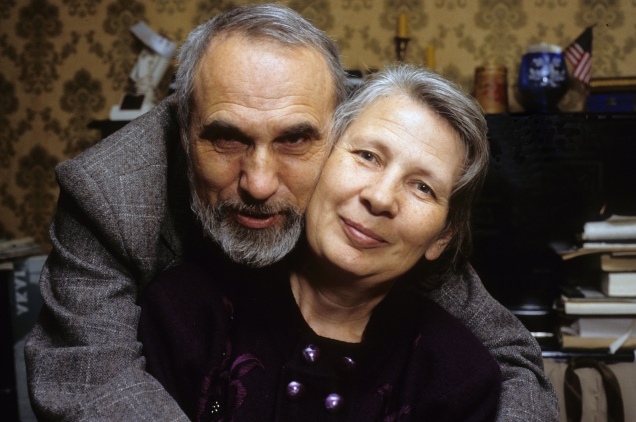Professor Evgeny Vladimirovich Kucheryavenko and his wife Raissa Pavlovna
NOVEMBER, 1992
Professor Evgeny Vladimirovich Kucheryavenko, my Russian language teacher, lives in an apartment building across the street with his wife Raissa and their 17-year-old son Vladimir.I bring a flashlight when I go there at night. All the stairwell light bulbs are missing.
The stove outlet exploded yesterday, so today they cook their meals on a hot plate. The fourth-floor flat has no hot water. Two 50-kilogram sacks of potatoes — enough for the winter — are hidden behind a curtain in the coolest corner of the living room. Yet, for special guests, they eat on expensive Japanese china. They bought the china 20 years ago, when Russians could afford such things. During our lessons, the lights sometimes flicker off, leaving us in darkness.
“Did I tell you that we are doomed?” the 55-year-old university professor asks while sipping tea during dinner. “We are doomed. We are doomed. The people are behaving worse and worse. This process of de-evolution is happening all over the world, but in our country it’s accelerated.”
Professor Kucheryavenko’s flat is his bunker, shielding his family from the speculators, the light bulb-stealing vandals, the back-talking, pony-tailed, graffiti-writing rabble who listen to Western rock music and swear in public places.
Unfortunately, the bunker has been infiltrated. His son Vladimir has joined the forces of the uncivilized. Euvgeny and Raissa have bought him more than 200 books – Pushkin, Chekhov, Dostoyevsky. But “Sonny,” as they call him, refuses to read them. Instead, he lifts dumbbells and belongs to a karate club. Bruce Lee, Sylvester Stallone and Arnold Schwartzenegger sneer at his parents from his bedroom walls.
“We don’t understand him,” the professor says. “He doesn’t understand us. We are foreigners to each other.” The professor pauses for a moment to sip his tea. “You should hear how the boy talks to his mother.”
“That wasn’t the way we acted when we were young,” Raissa says. “We had respect for older people.”
“At least we were afraid of older people,” Euvgeny says. “Now, these young people aren’t afraid of anything.”
This is more than a family quarrel. This is part of a greater battle being waged all over the former Soviet Union — a battle between the young and the old. Values and social and economic structures are changing rapidly. Young people like Vladimir are flexible enough to adapt to life in a market economy. He’s a self-assured young man. Besides karate, he’s studying economics at college. He sees opportunity in this “New Russia.”
But people like Euvgeny and Raissa — life-long socialists who still believe that buying something and reselling it at a higher price is shameful behavior — see chaos.They wish they were back in the 1960s, when life was more orderly and prosperous, when they understood their place in the world. But they have lost their place. Filled with self-doubt, they are like teenagers themselves.
“Maybe we were fooled by our government,” Raissa says. “Maybe we were fools. But we believed in something. Now we are living in this spiritual emptiness. I don’t know what to believe in. I feel like I’m a lost person.”
“We are doomed,” the professor says. “We are doomed. We are doomed.”
